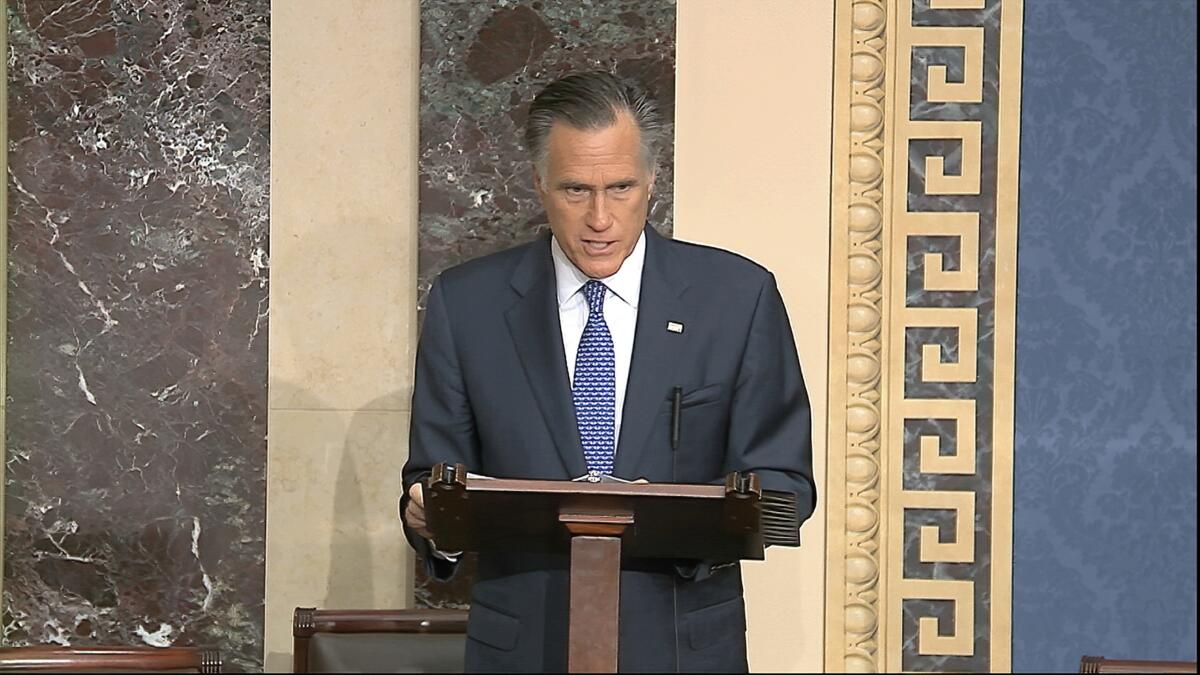Editorial: Trump’s acquittal is a stain on American history and a dangerous marker of what’s to come

- Share via
No one should be surprised that President Trump was acquitted by the U.S. Senate. That outcome was a virtual certainty from the start of the impeachment process.
But that doesn’t make it any less disheartening and dangerous. By voting for acquittal, the Senate not only gave a congressional seal of approval to the president’s “high crimes and misdemeanors,” but also may have emboldened a victorious Trump to offend against the Constitution again.
There can be little doubt that Trump abused the power of his office in his outrageous attempt to induce Ukraine to investigate former Vice President Joe Biden. Then he sought to stonewall the investigation by flatly refusing to release documents and ordering his subordinates not to testify.
Yet the Senate Republican majority brushed all that aside. Instead of taking seriously their oath to consider this historic case impartially according to the Constitution and the laws of the land, senators — led by Majority Leader Mitch McConnell (R-Ky.) — voted cravenly, and largely along party lines, to acquit the president. They ignored overwhelming evidence, disregarded undisputed facts, refused to hear additional witnesses, and thereby gave their imprimatur to Trump’s abuse of office.
Even some Republican senators who were willing to acknowledge that what Trump did was wrong refused to follow the logic of that conclusion and administer the necessary punishment. Sen. Lamar Alexander of Tennessee, for instance, said Trump’s “inappropriate” actions didn’t justify his removal from office. He suggested that the question was whether the Senate or the American people “should decide what to do about what he did.”
But what Trump did wasn’t just “inappropriate”; it was the sort of egregious abuse of power that the framers of the Constitution had in mind when they provided for impeachment. And they entrusted the decision on whether to impeach and remove the president to Congress, not the voters.
The lone Republican to vote to convict the president on either article of impeachment was former GOP presidential nominee Mitt Romney, now a freshman senator from Utah, who said ignoring the evidence of Trump’s abuse of power would “expose my character to history’s rebuke and the censure of my own conscience.” Bravo.
Just as he falsely claimed to have been exonerated by special counsel Robert S. Mueller III, Trump is now likely to portray his acquittal as vindication of his conduct, and proof that Democrats engaged in a partisan “witch hunt” to nullify the 2016 election. We fear that, with this acquittal in hand, he might feel freer to cheat in the upcoming election or to otherwise violate the norms, rules and laws that have historically constrained self-dealing by the president. If he does, the senators who winked at his wrongdoing will be co-conspirators.
A more reasonable reaction from a more reasonable president would be to feel shame at the historic rebuke he has received. Only two previous presidents have been impeached since the founding of the republic nearly two and a half centuries ago. That reproach is not to be taken lightly. We hope voters will remember it, along with the president’s many other grievous shortcomings, when they vote in November.
More to Read
A cure for the common opinion
Get thought-provoking perspectives with our weekly newsletter.
You may occasionally receive promotional content from the Los Angeles Times.










